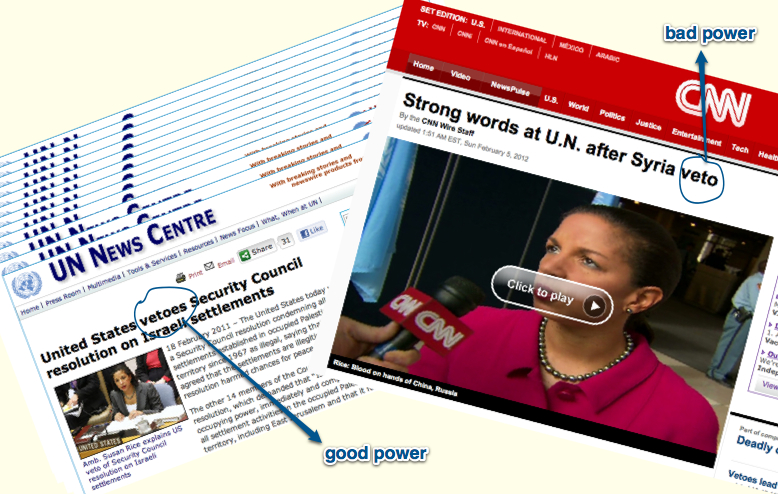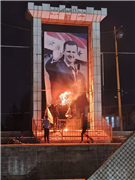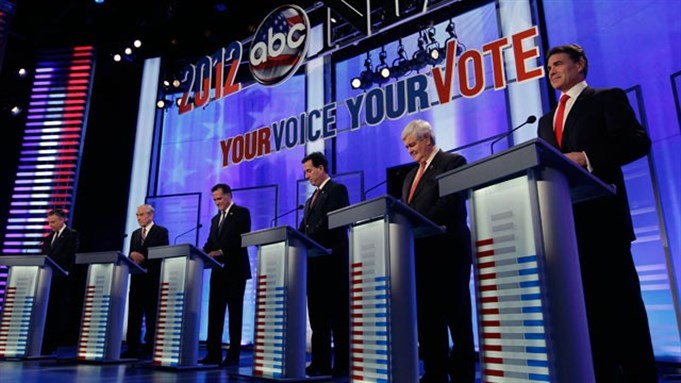A Quick Listing of The United States` Record of Veto Use at the United Nations (UN): 1972–2011*
[Including Resolutions against Decades of Atrocities and Violations, Often Supported and/or Bankrolled by the United States]
Year Resolution Vetoed by the United States
1972 Condemns Israel for killing hundreds of people in Syria and Lebanon in air raids.
1973 Affirms the rights of the Palestinians and calls on Israel to withdraw from the occupied territories.
1976 Condemns Israel for attacking Lebanese civilians.
1976 Condemns Israel for building settlements in the occupied territories.
1976 Calls for self determination for the Palestinians.
1976 Affirms the rights of the Palestinians.
1978 Urges the permanent members (USA, USSR, UK, France, China) to insure UN decisions on the maintenance of international peace and security.
1978 Criticises the living conditions of the Palestinians.
1978 Condemns the Israeli human rights record in occupied territories.
1978 Calls for developed countries to increase the quantity and quality of development assistance to underdeveloped countries.
1979 Calls for an end to all military and nuclear collaboration with the apartheid South Africa.
1979 Strengthens the arms embargo against South Africa.
1979 Offers assistance to all the oppressed people of South Africa and their liberation movement.
1979 Concerns negotiations on disarmament and cessation of the nuclear arms race.
1979 Calls for the return of all inhabitants expelled by Israel.
1979 Demands that Israel desist from human rights violations.
1979 Requests a report on the living conditions of Palestinians in occupied Arab countries.
1979 Offers assistance to the Palestinian people.
1979 Discusses sovereignty over national resources in occupied Arab territories.
1979 Calls for protection of developing counties` exports.
1979 Calls for alternative approaches within the United Nations system for improving the enjoyment of human rights and fundamental freedoms.
1979 Opposes support for intervention in the internal or external affairs ofstates.
1979 For a UN Conference on Women.
1979 To include Palestinian women in the UN Conference on Women.
1979 Safeguards rights of developing countries in multinational trade negotiations.
1980 Requests Israel to return displaced persons.
1980 Condemns Israeli policy regarding the living conditions of the Palestinian people.
1980 Condemns Israeli human rights practices in occupied territories: 3 resolutions.
1980 Affirms the right of self determination for the Palestinians.
1980 Offers assistance to the oppressed people of South Africa and their national liberation movement.
1980 Attempts to establish a New International Economic Order to promote the growth of underdeveloped countries and international economic co-operation.
1980 Endorses the Program of Action for Second Half of UN Decade for Women.
1980 Declaration of non-use of nuclear weapons against non-nuclear states.
1980 Emphasises that the development of nations and individuals is a human right.
1980 Calls for the cessation of all nuclear test explosions.
1980 Calls for the implementation of the Declaration on the Granting of Independence to Colonial Countries and Peoples.
1981 Promotes co-operative movements in developing countries.
1981 Affirms the right of every state to choose its economic and social system in accord with the will of its people, without outside interference in whatever form it takes.
1981 Condemns activities of foreign economic interests in colonial territories.
1981 Calls for the cessation of all test explosions of nuclear weapons.
1981 Calls for action in support of measures to prevent nuclear war, curb the arms race and promote disarmament.
1981 Urges negotiations on prohibition of chemical and biological weapons.
1981 Declares that education, work, health care, proper nourishment, national development, etc are human rights.
1981 Condemns South Africa for attacks on neighbouring states, condemns apartheid and attempts to strengthen sanctions: 7 resolutions.
1981 Condemns an attempted coup by South Africa on the Seychelles.
1981 Condemns Israel`s treatment of the Palestinians, human rights policies, and the bombing of Iraq:
18 resolutions.
1982 Condemns the Israeli invasion of Lebanon:
6 resolutions (1982 to 1983).
1982 Condemns the shooting of 11 Muslims at a shrine in Jerusalem by an Israeli soldier.
1982 Calls on Israel to withdraw from the Golan Heights occupied in 1967.
1982 Condemns apartheid and calls for the cessation of economic aid to South Africa: 4 resolutions.
1982 Calls for the setting up of a World Charter for the protection of the ecology.
1982 Sets up a United Nations conference on succession of states in respect to state property, archives, and debts.
1982 Nuclear test bans and negotiations and nuclear free outer space: 3 resolutions.
1982 Supports a new world information and communications order.
1982 Prohibition of chemical and bacteriological weapons.
1982 Development of international law.
1982 Protects against products harmful to health and the environment .
1982 Declares that education, work, health care, proper nourishment, and national development are human rights.
1982 Protects against products harmful to health and the environment.
1982 Development of the energy resources of developing countries.
1983 Resolutions about apartheid, nuclear arms, economics, and international law: 15 resolutions.
1984 Condemns support of South Africa in its Namibian and other policies.
1984 International action to eliminate apartheid.
1984 Condemns Israel for occupying and attacking southern Lebanon.
1984 Resolutions about apartheid, nuclear arms, economics, and international law. 18 resolutions.
1985 Condemns Israel for occupying and attacking southern Lebanon.
1985 Condemns Israel for using excessive force in the occupied territories.
1985 Resolutions about cooperation, human rights, trade and development. 3 resolutions.
1985 Measures to be taken against Nazi, Fascist, and neo-Fascist activities .
1986 Calls on all governments (including the United States) to observe international law.
1986 Imposes economic and military sanctions against South Africa.
1986 Condemns Israel for its actions against Lebanese civilians.
1986 Calls on Israel to respect Muslim holy places.
1986 Condemns Israel for sky-jacking a Libyan airliner.
1986 Resolutions about cooperation, security, human rights, trade, media bias, the environment, and development: 8 resolutions.
1987 Calls on Israel to abide by the Geneva Conventions in its treatment of the Palestinians.
1987 Calls on Israel to stop deporting Palestinians.
1987 Condemns Israel for its actions in Lebanon:
2 resolutions.
1987 Calls on Israel to withdraw its forces from Lebanon.
1987 Cooperation between the UN and League of Arab States.
1987 Calls for compliance in the International Court of Justice concerning military and paramilitary activities against Nicaragua and a call to end the trade embargo against Nicaragua: 2 resolutions.
1987 Measures to prevent international terrorism, study the underlying political and economic causes of terrorism, convene a conference to define terrorism and to differentiate it from the struggle of people from national liberation.
1987 Resolutions concerning journalism, international debt, and trade: 3 resolutions.
1987 Opposition to the build up of weapons in space.
1987 Opposition to the development of new weapons of mass destruction.
1987 Opposition to nuclear testing. 2 resolutions.
1987 Proposal to set up South Atlantic "Zone of Peace".
1988 Condemns Israeli practices against Palestinians in the occupied territories: 5 resolutions (1988 and 1989).
1989 Condemns US invasion of Panama.
1989 Condemns US troops for ransacking the residence of the Nicaraguan ambassador in Panama.
1989 Condemns US support for the Contra army in Nicaragua.
1989 Condemns illegal US embargo of Nicaragua.
1989 Opposing the acquisition of territory by force.
1989 Calling for a resolution to the Arab-Israeli conflict based on earlier UN resoltions.
1990 To send three UN Security Council observers to the occupied territories.
1995 Affirms that land in East Jerusalem annexed by Israel is occupied territory.
1997 Calls on Israel to cease building settlements in East Jerusalem and other occupied territories:
2 resolutions.
1999 Calls on the United States to end its trade embargo on Cuba:
8 resolutions (1992 to 1999).
2001 To send unarmed monitors to the West Bank and the Gaza Strip.
2001 To set up the International Criminal Court.
2002 To renew the peace keeping mission in Bosnia.
[Chart above from http://www.phon.ucl.ac.uk/home/geoff/UNresolutions.htm]
[Chart below from: http://www.krysstal.com/democracy_whyusa03.html]
2002 Condemns the killing of a UN worker from the United Kingdom by Israeli forces. Condemns the destruction of the World Food Programme warehouse.
2003 Condemns a decision by the Israeli parliament to "remove" the elected Palestinian president, Yasser Arafat.
2003 Condemns the building of a wall by Israel on Palestinian land.
2003 To end the US`s forty-year embargo of Cuba.
2004 Condemns the assassination of Hamas leader Sheik Ahmad Yassin.
2004 Condemns the Israeli incursion and killings in Gaza.
2004 Production and processing of weapon-usable material should be under international control.
2006 Calls for an end to Israeli military incursions and attacks on Gaza.
2006 Calls for an end to the financial embargo against Cuba.
2007 Calls for peaceful uses for outer space.
2007 Calls for a convention against female descrimination.
2007 Concerning the rights of children.
2007 Concerning the right to food.
2007 On the applicability of the Geneva Convention to the protection of civilians in time of war.
2007 Calls for the protection of the Global Climate.
2007 Calls for Indian Ocean to be declared a zone of peace. Calls for a nuclear weapon-free South East Asia.
2007 Calls for the right of self determination for the Palestinian people. Other resolutions regarding the Palestinians and their rights.
2008 Calls for progress towards an arms trade treaty.
2008 Banning the development of new weapons of mass destruction.
2008 Assuring non-nuclear states they will not be attacked or threatened with nuclear weapons.
2008 Prevention of the development of an arms race in outer space and transparency in outer space activities.
2008 Calls to decrease the operational readiness of nuclear weapons systems and to ban nuclear weapons.
2008 Calls to end the use of depleted Uranium in weapons.
2008 Concerning the trade in illicit small arms.
2008 Calls for a nuclear free Central Asia and a nuclear free Southern Hemisphere. Prevention of proliferation in the Middle East.
2008 Calls for a comprehensive (nuclear) test ban treaty. Calls for a nuclear weapon free world.
2008 Calls for a treaty on children`s rights.
2008 Condemns racial descrimination.
2008 Affirms the soverignty of Palestinians over the occupied territories and their resources.
2008 Affirms the right of the Palestinians to self determination.
2008 Calls on Israel to pay the cost of cleaning up an oil slick off the coast of Lebanon caused by its bombing.
2008 Calls for a new economic order.
2008 Calls for a right of development for nations.
2008 Calls for a right to food.
2008 Respect for the right to universal freedom of travel and the vital importance of family reunification.
2008 Concerning developments in information technology for international security.
2008 Resolutions concerning Palestine, its people, their property, and Israeli practices in Palestine, including settlements.
2009 Calls for an end to the twenty-two-day-long Israeli attack on Gaza.
2011 Calls for a halt to the illegal Israeli West Bank settlements.
2011 Calls for Israel to cease obstructing the movement and access of the staff, vehicles and supplies of the United Nations Relief and Works Agency for Palestinian Refugees.
2011 Calls for the immediate and complete cessation of all Israeli settlement activities in all of the Occupied Palestinian Territory, including East Jerusalem, and in the occupied Syrian Golan.
* Between 1972 and 2001, the United States used its veto power in the Security Council thirty-nine times to block resolutions critical of Israeli policies in the Occupied Palestinian Territories, more than all other countries have used their veto on all other issues combined. (Source: Stephen Zunes, Tinderbox: US Middle East Policy and the Rootes of September Terrorism.)

[download full-size collage here]
![[Collage by author from web postings: UN.org and CNN.com]](https://kms.jadaliyya.com/Images/357x383xo/gpbpfinalpostimage.jpg)

















